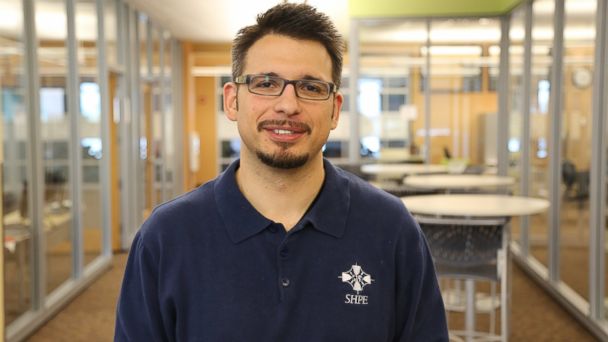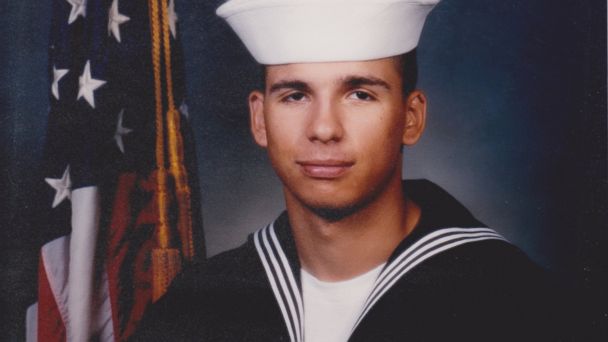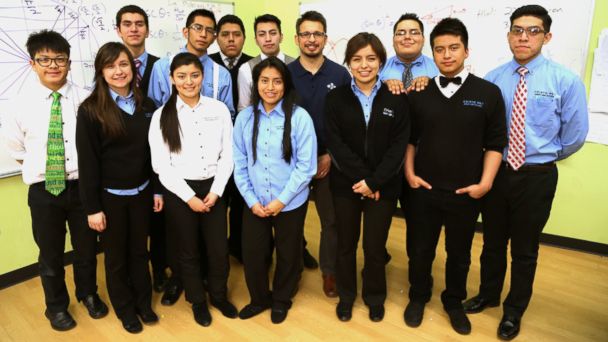US Navy Vet Inspiring Next Generation of Latino Engineers
Former U.S. Navy Nuke Barry Cordero said he knew from an early age that he wanted to help people. Growing up poor in the South Side of Chicago as the descendant of immigrants from both Mexico and Germany, he never heard of engineering as a child. He did know that he wanted to go to college and be a professional one day.
Cordero said he wasn't a great student in high school. "I was in a lot of honors classes but I didn't perform really well," he said. "I knew I wanted to be a doctor one day because I really had a passion for helping people."

U.S. Navy Nuke and Society of Hispanic Professional Engineers (SHPE) President Barry Cordero. (Angel Canales/ABC News)
One day he went to his school guidance counselor and asked him for advice about what he should do.
"He really discouraged me from pursing college. He encouraged me to use my mechanical experience to pursue a mechanical education," Cordero recalled.
Despite the advice, he applied to the University of Illinois and at the same time he went to a Navy recruiter to check out his options. On his second try, Cordero passed the nuclear engineering entry exam and two weeks letter he received an acceptance letter from the University of Illinois. He ended up going to the Navy since he already signed up for service and four days after he graduated high school he was on a bus for boot camp.

U.S. Navy vet Barry Cordero's boot camp graduation photo. (Courtesy of Barry Cordero)
Cordero joined the Navy in 1997 and served for 6 years. He went on to become a Nuclear Electrician's Mate and in 1999 was assigned the USS Nimitz, which was being refueled and overhauled at the time. "It was a unique experience and I had a lot of opportunities to teach and that sparked my interest in teaching and coaching," he said.

Barry Cordero with other nuclear engineers at the Naval Nuclear Power Training Command in Goose Creek, S.C. (Courtesy of Barry Cordero)
When he left the Navy in 2003, Cordero decided to pursue a bioengineering degree. He enrolled at the University of California, San Diego bioengineering program and graduated in 2007.
When he was a tutor at Mathematics, Engineering, Science Achievement ( MESA), there was a group of students working on a project for the Society of Hispanic Professional Engineers (SHPE). The students asked Cordero to help them with the project and that was his first pull into the organization he now leads as president. He said he enjoyed organizing that project with the students and having an impact in the community.
"I heard a lot of stories of people who didn't know what engineering is, how you could become an engineer and how they can be creative and turn that into a career," said Cordero, who now works at Medtronic in Minneapolis, Minn.
That project sparked Cordero's idea to help the community.
In July 2013, Cordero was named president of SHPE. The society was started in 1994 by a group of civil engineers in Los Angeles and now serves more than 12,000 members in 400 chapters across the United States. Their focus is to help with the professional development and opportunities for professional engineers.
"Engineering is still not that known in the Latino community," Cordero said, noting that only 5% of high school graduates pursue a career in science or engineering. "We have a very difficult problem with them achieving and becoming an engineer or scientist."
According to a GradNation report, Latinos have a 76 percent high school graduation rate compared to 85 percent for non-Latino whites, and 68 percent for African Americans.
The Latino population in the U.S. is 53 million, according to the U.S Census Bureau, making them the nation's largest and fastest-growing ethnic or racial minority. And the Latino population is expected to double by 2050.
"Because the Latino population within the U.S. is growing so rapidly, we see the Latino population as the solution to our stem crisis. Every year, fewer and fewer people are interested in engineering and science in the U.S. and if we want to grow our own engineers, grow our own innovators and continue to compete with the world in innovation and technology we have to do it on our own," Cordero said.

Barry Cordero, center, with students from Cristo Rey High School in Minneapolis, Minn. Front row (l-r): Scott Hoang, Venessa Alvarez Dahl, Gizel Ojeda-Gomez, Jessica Paucar-Lema, Janet Jimenez-Olivo, Jason Chavez, and Gabriel Jara. Back row (l-r): Anthony Avalos, Cesar Morales, Luis Rodriguez, Kevin Morales Hernandez, Barry, and Dennis Lema. (Angel Canales/ABC News)
One of the programs Cordero and SHPE works on is Noches de Ciencias , a night of science. This is a national initiative to promote an interest in science, technology, engineering and math (STEM) in the Latino community.
Cordero has had a strong influence on the Noche de Ciencias initiative, which has reached more than 150 schools since 2012. There's also a program in which parents get to have more info regarding application process to college, how much it costs to attend college and how to navigate financial aid and student loans.
"Because our population is first- and second-generation citizens, a lot of them just don't know about all these opportunities," Cordero said.

Barry Cordero along with other Society of Hispanic Professional Engineers mentors and Medtronic Medtronic members at Cristo Rey Jesuit High School in Minneapolis, Minn. From left to right Angel Paucar, Angela Riascos, Noi Keothammakhoun and James Rodriguez.
One of the students Cordero is mentoring is Gizel Ojeda-Gomez, a senior at Cristo Rey Jesuit High School in Minneapolis who aspires to be biomedical engineer.
"When I got into high school and I found out about SHPE I was really excited because it was another group of people who wanted to work in engineering and they were like me," said Ojeda-Gomez who is also an intern at Medtronic and has been accepted to the engineering program at Michigan Tech University, Marquette University in Wisconsin and University of Minnesota.
Cordero knows how important it is to mentor these students. "Students who get involved in societies and affinity groups where they meet people who look like them and they meet people with a similar background, they're having 20 to 30 percent better survival rates through their engineering programs," he said.
Cordero said seeing the impact of the work he does is very rewarding. "It is amazing to see students completely change their mind about what their limitations are. We have students that started with SHPE and are now ready to start their first careers in engineering and it is really empowering for them and it brings a lot of satisfaction," he said.
Second Tour is an ABC News digital series profiling the lives of military veterans who are doing unique things in the civilian world. For more stories, click here.
ABC News video editor Arthur Niemynski contributed to this report.